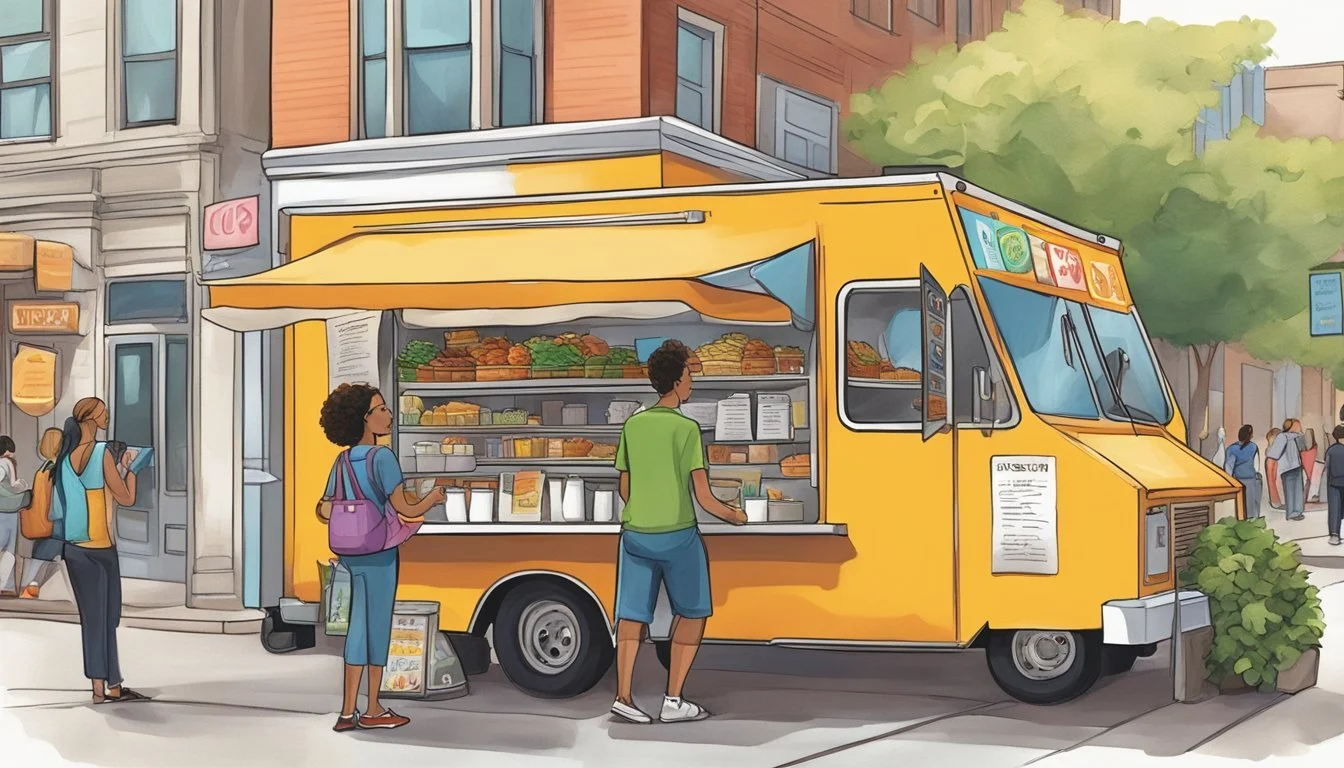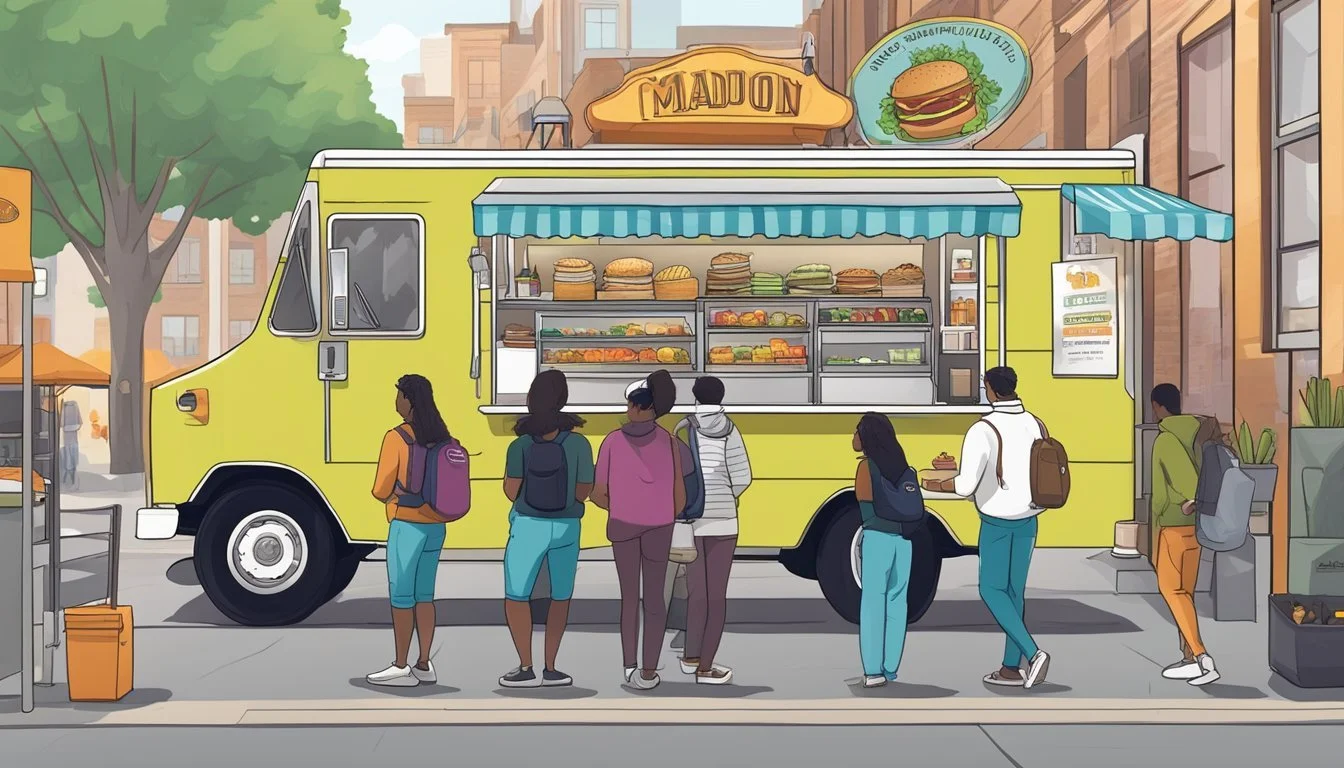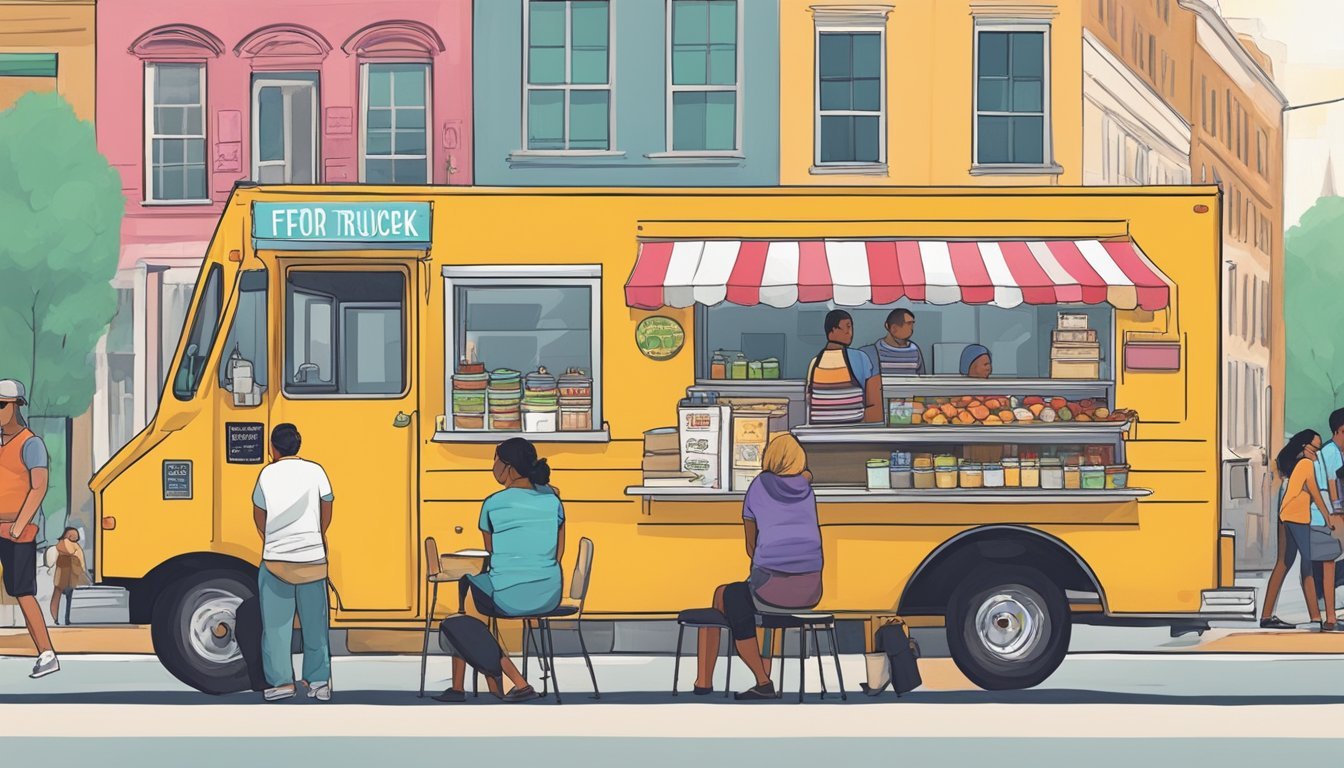Food Truck Laws Madison, Wisconsin
Navigating Regulations for Mobile Eateries
Operating a food truck in Madison, Wisconsin is a venture that comes with specific guidelines designed to ensure the health and safety of the public, along with fair business practices. The City of Madison has established parameters for food cart size within certain areas, notably the Mall/Concourse and Southeast Campus, where food carts are limited to 56 square feet. For food trucks and trailers operating outside these high-density areas, the dimensions can be significantly larger. As of September 28, 2019, these mobile food establishments are allowed a maximum size of 28 feet in length, 8 feet and 6 inches in width, and 13 feet and 6 inches in height, enabling more expansive operations citywide.
Wisconsin Department of Agriculture, Trade and Consumer Protection, along with Local Public Health Departments, play crucial roles in supervising these mobile eateries. Modifications to food services or menu options may be mandated in order to align with public health standards. Food truck owners must be cognizant of the statewide requirements which dictate that, in the interest of hygiene and food safety, all mobile food establishments return to their service base at least every 24 hours, as part of the Wisconsin Food Code Requirements.
In Madison specifically, obtaining the proper licensing is an important step for food truck operators. The permits ensure that all vendors meet the necessary health code and vending location specifications. For those looking to participate in Madison's vibrant street food scene, awareness and adherence to these regulations are the keys to a successful food truck business.
Basics of Food Truck Operations in Madison
In Madison, Wisconsin, the food truck scene is blossoming under specific regulations. Mobile food operators must navigate these rules to operate legally within city limits.
Understanding Food Trucks vs. Food Carts
In Madison, one must distinguish between food trucks and food carts due to differing regulations and size requirements. A food cart typically refers to mobile food units that are smaller and can be positioned in the Mall/Concourse and Southeast Campus areas. They have a maximum size restriction of 56 square feet.
Conversely, full-sized food trucks and trailers are larger mobile kitchens. Since September 28, 2019, these vehicles are permitted to operate outside the high-density vending areas with some specifications: their size should not exceed 28 feet in length, 8'6" in width, and 13'6" in height. This is often referred to as the "Citywide" category, which reflects their broader operating allowance in comparison to the more restricted food carts.
Operators of both food trucks and food carts are required to adhere to city Food Cart & Food Vending Guidelines, which ensures public safety and fair competition among vendors. Obtaining a Street Vending (Basic) License is part of the stipulations set forth by Madison's Economic Development Division and a fundamental step for all mobile food operators.
Legal Requirements and Licensing
In Madison, Wisconsin, operating a food truck hinges on compliance with state and local regulations. Ensuring all necessary permits and licenses are acquired is essential for legal operation and involves coordination with various regulatory entities.
Obtaining the Necessary Permits and Licenses
Food truck operators must first secure a Mobile Food Establishment License from the Wisconsin Department of Agriculture, Trade, and Consumer Protection. This entity oversees the adherence to the Wisconsin Food Code, ensuring that all food trucks meet health and safety standards. Additionally, they must obtain a Seller's Permit from the state for sales tax purposes and an Employer Identification Number (EIN) for tax identification.
Operators are also required to interact with the local Public Health Madison & Dane County for a Public Health Permit. This ensures that food trucks are regularly inspected and maintain high hygiene standards as mandated by city law. Specific size restrictions must also be noted; for instance, the maximum size allowed for a Mall/Concourse food cart is 56 square feet.
Food Truck Vendor Licensing Process
The licensing process involves a series of steps:
A pre-inspection is scheduled with the Public Health Madison & Dane County to ensure all health and safety regulations are met.
Following successful pre-inspection, a detailed application for the requisite licenses must be submitted.
After the application and associated fees are processed, and inspections are passed, the food truck operator is issued a license allowing for legal vending in the City of Madison.
Adherence to state law and city ordinances throughout this process is vital. Food trucks in Wisconsin are treated similarly to full-scale restaurants concerning licensing requirements, inspections, and food safety protocols. Operators are encouraged to maintain transparency and regular communication with the Health Department to ensure ongoing compliance.
Health and Safety Regulations
In Madison, Wisconsin, food truck operators must navigate a comprehensive set of health and safety regulations. These rules, set forth by city and state entities, are integral in ensuring the well-being of customers and the integrity of the mobile dining experience.
Adhering to Health Department Standards
The City of Madison has delineated standards that all food carts and trucks must meet to operate. These include specific size constraints and health regulations relevant to food handlers. Operators must secure a Food Establishment License and pass the Health Department’s plan review. This process verifies design and construction, ensuring that facilities meet safety and sanitation requirements. As part of maintaining standards, all food handlers must also obtain a food handler's license, demonstrating their comprehension of safe food practices.
Food Safety and Inspection Protocols
Regular inspections are a critical aspect of the food safety system. Mobile food establishments are subject to unannounced inspections by the local Health Department. They assess the food truck's adherence to food safety protocols, inspecting equipment to ensure it is in good repair and properly sanitized. The Health Department may also warrant modifications in food service or menu items if any health risks are identified.
Inspection reports, which detail the findings and any corrective actions required, must be addressed promptly. Failure to comply with health and safety regulations can result in penalties, including revocation of the food establishment license.
Operating Locations and Zoning
In Madison, Wisconsin, food trucks and carts must navigate various regulations that govern where they can park and operate. These regulations are primarily focused on ensuring public safety and maintaining the orderly use of public spaces.
Parking and Zoning Laws
In the City of Madison, food trucks and carts must adhere to stringent parking and zoning laws. There are designated areas, such as the Mall/Concourse zones, where vendors can operate. The regulations stipulate that trucks and carts parked on the street must obey all parking regulations and respect the flow of traffic and pedestrian areas. Additionally, they are subject to size restrictions: carts in Mall/Concourse areas have a size limit, while food trucks operating outside of those high-density areas can be larger. Food vendors must also comply with local zoning requirements, which may dictate their proximity to brick-and-mortar restaurants and other businesses.
University of Wisconsin-Madison Location Rules
At the University of Wisconsin-Madison, specific rules apply to food trucks and carts operating on campus. These vendors typically need to secure permission from the university, which manages its own food selling areas, different from the city's public concourse and mall spaces. The university may have distinct requirements related to curb location, hours of operation, and the types of food that can be sold to protect the interests of on-campus dining services and ensure a diverse food offering for students and faculty.
Business Operational Aspects
In Madison, Wisconsin, the operational aspects of running a food truck involve specific costs and opportunities for financial support. Entrepreneurs should be well-versed in the expenses and be keen to explore new business opportunities within the industry.
Costs Involved in Running a Food Truck
One of the primary considerations for food truck owners is the array of costs associated. These fees can include the purchase of the vehicle, kitchen equipment, and ongoing operational expenses such as ingredients and staff wages. Additionally, regulatory costs come in the form of licenses, permits, and an inspection fee from health and city authorities. A breakdown of these expenses helps to understand the financial commitment required:
Vehicle and Equipment: The price of a food truck plus kitchen gear.
Licenses and Permits: Necessary for legal operation in Madison, prices vary based on specific regulations.
Inspection Fee: Charged by city health authorities to ensure compliance with health codes.
Operational Expenses: Fuel, ingredients, and employee salaries.
New Business Opportunities and Financial Support
Madison welcomes entrepreneurs, offering various new business opportunities. These include the ability to operate in high-density vending areas or citywide, depending on the food truck's size. The City offers resources for those looking to start or expand their food truck enterprise, such as Food Cart & Food Vending Guidelines.
To support growth, food truck owners can access loans and grants tailored to small businesses. The city's economic development programs may provide financial support to those who qualify, helping to mitigate the initial costs of starting a food truck business. Thorough research into these options is advised to fully capitalize on financial support available:
Loans: Traditional or SBA-backed loans for startup or expansion costs.
Grants: May be available from city programs or private foundations, typically awarded for specific purposes without repayment.
Supplementary Operational Guidelines
In Madison, Wisconsin, food truck operators must navigate specific regulations concerning alcohol licensing and the handling of special events and catering. These rules ensure safe and legal operation within city limits.
Alcohol Licensing and Regulations
In Madison, operators offering alcohol beverages must obtain the appropriate permits. The City recognizes two types: Class B for beer and Class C wine licenses. The city's Alcohol License Review Committee (ALRC) oversees the issuance, and food truck vendors must apply through the City Clerk's Office. It's imperative that vendors comply with Madison's alcohol laws, which outline where and how alcohol may be sold from their food trucks.
Permit Required: A permit is mandatory for alcohol sales.
Application Process: Apply via the City Clerk's Office.
Compliance: Adherence to local regulations is non-negotiable.
Handling Special Events and Catering
For special event catering, Madison requires food truck vendors to carry a Temporary Food Establishment Permit if the event is outside of their usual operations. Madison's Department of Public Health oversees such permits. A separate set of guidelines applies to large events, including those where alcohol is served.
Temporary Permit: Needed for one-time or infrequent events.
Public Health Department: Issues permits and ensures food safety compliance.
Event Guidelines: Special rules may apply to large or public gatherings.
By understanding these supplementary operational guidelines, food truck operators can conduct their business with confidence, staying compliant with Madison's specific legal frameworks.
Covid-19 Impacts on Food Truck Operations
The Covid-19 pandemic resculpted the landscape of food truck operations in Madison, Wisconsin, necessitating adaptation to new safety measures and the utilization of vital resources designed to aid vendors through the crisis.
Adapting to Social Distancing and Safety Measures
Food trucks in Madison faced a significant shift in operations due to Emergency Order #12 and the subsequent Safer at Home Order. Vendors were required to overhaul their methods to comply with stringent social distancing rules. This included restructuring their layouts to ensure that customers remained at least six feet apart and eliminating features like salad bars, beverage stations, and buffets to minimize contact points. In place of traditional service methods, many food trucks pivoted to a model that emphasized online ordering, take-out, and delivery services to keep their operations afloat while still providing safe food practices. With no seating permitted, food trucks became purely transactional spaces focused on conducting business as safely as possible.
Resources for Food Trucks During the Pandemic
To support food truck operators, the University of Wisconsin-Madison Division of Extension, in collaboration with the City of Madison, developed a comprehensive Covid-19 Resource Guide. This guide provided vendors with the necessary information to navigate the complexities of the pandemic, such as how to implement best practices like self-service operations efficiently and safely. Additionally, it served as a touchpoint for the latest updates on regulations and safety guidelines critical for maintaining a hygienic and compliant food service environment.
Marketing and Local Engagement
In Madison, Wisconsin, food trucks are thriving by leveraging targeted marketing tactics and actively engaging with the community. These strategies not only attract a steady flow of customers but also build strong relationships with local entities, including the health department, which oversees food safety and compliance.
Strategies for Attracting Customers
Brand Visibility: In a bustling city like Madison, standing out is critical. Food trucks can maximize visibility by utilizing vibrant, clear signage and distinct branding that reflects the truck's personality and the culinary experience it offers.
Online Presence: An updated online profile, including a well-maintained website and active social media accounts, are essential in tapping into the local market. With precise and engaging content, food trucks can inform customers about their menu, location, and hours of operation. Madison's locals often rely on digital channels to find their next food destination, making a food truck's digital footprint a critical facet of its strategic marketing.
Community Event Participation
Local Events: Active participation in local events and festivals can help food trucks gain exposure and build a loyal customer base. They should keep track of events through the City of Madison's website and coordinate with event organizers to secure a spot.
Partnerships with Local Businesses: Forming partnerships with local businesses and breweries can be mutually beneficial. For example, setting up outside a popular microbrewery allows the food truck to tap into the brewery's customer base while providing patrons with convenient dining options.
By implementing these focused marketing strategies and participating in community events, food trucks in Madison can attract and retain customers effectively, while maintaining a healthy and cooperative relationship with the local health department and other community stakeholders.
Compliance with City Regulations
In Madison, Wisconsin, compliance with city regulations is crucial for food truck operators. They must navigate local ordinances and adhere to the guidelines set forth by the city to operate legally.
Street Vending Coordinator's Role
The Street Vending Coordinator plays a pivotal role in overseeing street vending activities within Madison. They are responsible for ensuring that all food trucks meet the city's requirements for public vending. The coordinator facilitates compliance by guiding vendors through the regulatory process and issuing necessary permits. This includes checking that food truck dimensions do not exceed the stipulated 56 square feet for Mall/Concourse and Southeast Campus food carts or 28 feet long, 8 feet 6 inches wide, and 13 feet 6 inches tall for full-size food trucks and trailers outside high-density areas, as per the City of Madison's guidelines.
Compliance with Local Ordinances
To comply with local ordinances, food truck vendors in Madison must adhere to specific municipal ordinances that govern food safety, vending locations, and operating hours. The local health department conducts regular inspections to ensure food truck operators maintain hygiene standards and handle food safely. Vendors must secure all applicable licenses and permits, which may include a Public Health Permit and Seller's Permit as detailed by Wisconsin Department of Agriculture, Trade and Consumer Protection. Compliance with these regulations is non-negotiable to maintain public health and safety.
Additional Information and Resources
Food cart and food truck vendors operating in Madison, Wisconsin, can access numerous resources to guide their business practices and abide by regulations. Dane County provides comprehensive assistance through various programs aimed at food service entrepreneurs.
Licensed Wisconsin food carts must adhere to guidelines set by the Department of Agriculture, Trade and Consumer Protection. Specifically, the Division of Food and Recreational Safety enforces standards to ensure public health:
Application and renewal of licenses
Inspections for compliance with hygiene and safety
Food labeling and temperature control
When it comes to marketing on wheels, portable signs are regulated to maintain visual order and ensure public safety. Vendors are advised to understand the rules governing signage, which can impact where and how they can attract a crowd.
Licensing & Permits: City of Madison Guidelines
Safety Regulations: DATCP Mobile Food Establishments
Moreover, considering the adaptability required for such businesses, vendors are encouraged to also evaluate the viability of a delivery service, which could extend their reach beyond the traditional address-based enterprise.
Regarding product specifics, guidelines for handling and selling meat products are strict, and vendors should ensure they are informed of the proper storage, handling, and preparation practices to avoid health risks and comply with local laws.
Lastly, additional resources that can aid food cart and truck vendors include grants, loans, childcare support, and business development seminars, befitting various entrepreneurial needs to compete in a bustling market.
Conclusion
Regulatory adherence is crucial for food truck operations in Madison, Wisconsin. Food truck vendors must navigate a framework that ensures public safety and compliance with local ordinances. This includes but is not limited to size restrictions, licensing requirements, and hygiene standards.
Key Takeaways:
Size Requirements: Food carts are limited to a maximum size, whereas food trucks have their own prescribed dimensions outside of high-density vending areas. More details on the maximum allowable size can be found in the City of Madison's Food Cart and Food Vending Guidelines.
Licensing: Prior to operating, vendors must obtain a license from the local health department or DATCP. Details regarding licensing can be accessed through resources such as the WI Food Cart and Food Truck Vendor Resource Guide.
Food Safety: The state may impose limitations to protect health and safety. Vendors are encouraged to be proactive about food safety by reviewing the DATCP Home Mobile and Transient Retail Food Establishments provisions.
Compliance is not optional but mandatory. By staying informed and vigilant in their practices, food truck owners contribute to Madison's vibrant street food scene while ensuring a safe and enjoyable experience for all.









